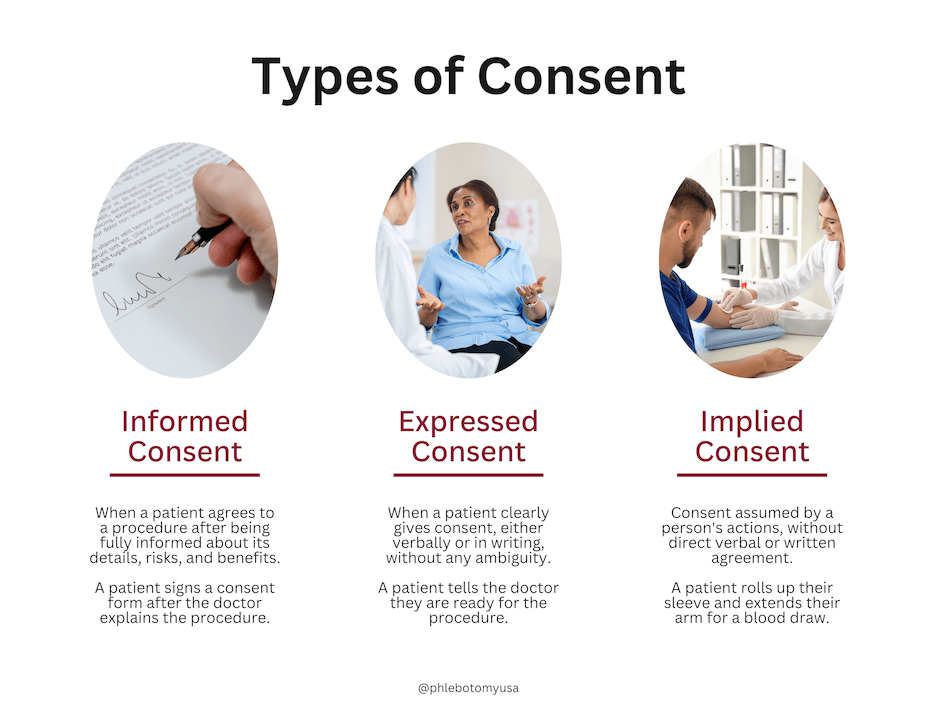26 Feb Here’s Why Ethics Are Crucial to Phlebotomy
Phlebotomists are key players in healthcare, specializing in drawing blood for tests. Their job isn’t just about technical skills; it’s also about ethical behavior to ensure patient safety, privacy, and trust. Here’s a breakdown of the ethics involved in phlebotomy, explained simply and clearly:
Importance of Ethics in Phlebotomy
In short, ethics are moral principles that guide phlebotomists to act a certain way. The overarching purpose of these principles is to protect both the patient and the phlebotomist. But ethics does more than just that. Here are a few reasons why ethics are important in phlebotomy:
Builds trust
If a phlebotomist is always honest and fair, patients will feel more comfortable with them. This can help patients feel less scared or worried when they need to have blood taken. When patients trust their phlebotomist, they’re more likely to relax, which makes everything go smoother for both the patient and the phlebotomist.
Protects patient’s rights
It’s a phlebotomist’s job to keep patient information private and secure. This means they have to be really careful about how they handle and share patient records and details. Doing this the right way keeps patients safe and makes sure they get the best care possible.
Promotes professionalism
When phlebotomists stick to ethical rules, it shows they’re serious about their job. This not only looks good for them but also for the place where they work. It’s all about giving safe and effective care, which is what healthcare is supposed to do.
Ethics in Action
Here’s how phlebotomists can put these ethical ideas into practice:
How to Build Trust:
To earn trust, phlebotomists need to be kind and understanding. They should explain what they’re going to do in a simple way so the patient knows what to expect. They should also listen to any worries the patient might have and try to make the experience as comfortable as possible.
How to Protect Patient Rights:
Before taking blood, a phlebotomist needs to make sure the patient agrees with it and understands what it’s for. This is called getting “informed consent.” They also need to keep all the patient’s information private, only sharing it with other healthcare workers who need to know to help the patient.
How to Promote Professionalism:
Phlebotomists should always follow the rules and keep their work area clean and safe. They need to treat all patients with respect, no matter if the patient is there or not. And they should always keep things professional, which means not getting too personal with patients.
 Ethical Dilemmas
Ethical Dilemmas
Sometimes, phlebotomists face tough situations, like working with patients who are really scared or making a mistake. Here’s how they can handle these challenges the right way:
Difficult Patients
Difficult patients can come in many different forms. They might be scared, have disabilities, have hard-to-find veins, or even be combative. It’s important to be adaptable and have a plan for when these things happen. If you find yourself in one of these situations, try these steps:
-
- Approach the patient with compassion. Make sure that you are listening and addressing their concerns.
- Be sensitive to the needs of the patient. Make necessary adjustments for those with disabilities or specific beliefs.
- Use methods like distraction, conversation, or creating a soothing environment to ease patient anxiety.
- Always obtain consent before carrying on with a procedure. If consent is withdrawn, stop immediately.
Errors and Mistakes
Even the best phlebotomists can make mistakes. Mixing up labels, making a mistake in collecting blood, or other slip-ups can happen. It’s super important to fix these mistakes quickly before they cause bigger problems. Here’s what to do if this happens:
-
- Take immediate action. If you notice something’s wrong, tell the right people and start fixing it right away.
- Prioritize your and your patient’s safety over everything else. This is the most important thing.
- If a patient is involved, let them know what happened and that you’re taking care of it.
- Think about why the mistake happened and how you can stop it from happening again.
Conclusion
In conclusion, acting ethically is crucial, both in phlebotomy and all other aspects of life. This is the best way to keep you safe and make sure patients get the best care. Ethical phlebotomists can build trust with their patients, keep their information safe and private, and help lift the moral standards of the whole healthcare world.

